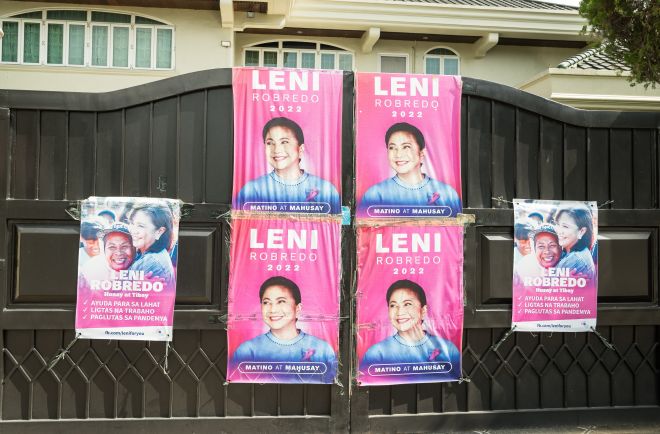The 2022 Philippine Elections – the Election of our Lives!
Published on May, 03 2022
By Cindy Domingo
Jane Adams Branch
May 2022
After six years of the war against drugs in the Philippines (resulting in over 30,000 deaths according to the International Criminal Court’s preliminary report) rampant government corruption cases, a pandemic that has left the Philippines in economic shambles, and a government unresponsive to repeated typhoon disasters, hundreds and thousands of Filipinos waving pink flags, wearing pink shirts and hats, and handing out pink baked goods have turned out to support Leni Robredo in her bid to become the next Philippine President in this month of May. Robredo, the current Philippine Vice President, has been met with huge rallies throughout her travels within the country, such as her birthday rally at the end of April, numbering 420,000 in Pasay, an area just south of Manila. Her running mate is Kiko Pangilinan, a popular sitting Philippine Senator who gave up his reelection bid to run for Vice President at the request of Robredo.
Many predict that this election is the election of our lives, given what is at stake. While there are several Presidential and Vice-Presidential candidates (the Philippines doesn’t have a primary, narrowing the field to the top two), Leni Robredo finds herself running against Bong Bong Marcos (also known as Marcos, Jr), the son of deposed dictator Ferdinand Marcos and his wife Imelda Marcos. Pangilinan is running against Sarah Duterte, the daughter of current President Rodrigo Duterte. This has been cast as both an election against the Marcos-Duterte political dynasty as well as stopping a possible 12 more years of authoritarian government since terms are six years long. Sarah Duterte would undoubtedly run for President after Marcos Jr’s term ends – if Marcos Jr. does not try to stay longer.
As Vice President and a former Congressional Representative, Robredo has a history of effective programs, especially in the areas of disaster relief and COVID-19 pandemic response, women’s empowerment, and gender equality. The Philippine Commission on Audit has rated her Office with the highest marks for excellent fiscal management. Robredo has taken on human rights cases for women, children, urban poor, workers, and fisherfolk as a lawyer. A statement signed by 150 human rights lawyers stated, “while she (Robredo) has only been a public official for nine years, she has been a public servant for most of her life.” While Marcos, Jr has served in several elected positions, he has a lackluster record of sponsored bills and serves as the administrator of the unexplained wealth of the Marcos family, whom most believe is the stolen treasury of the Philippines government, estimated now worth $10 billion. Cases have also been filed in court that Marcos Jr. is ineligible to run for office since he has been convicted of tax evasion.
While most surveys and media outlets have predicted a win for the Marcos/Duterte ticket, no one can forget the Filipino people’s tenacity to fight for democracy in 1986 which resulted in the yellow-colored peoples’ power movement forcing Ferdinand Marcos and his family to flee the Philippines as millions of people took to the streets. Robredo, with her ‘Kakampink’ movement, took on the color pink as the symbol of democracy and combined it with the word “kakampi” which means ally. At a rally in Cebu, the second largest city in the Philippines, amongst the 250,000 participants outfitted in pink was a caribou painted pink with Robredo and Pangilinan’s faces to symbolize the support of farmers for the two. Massive volunteers, many of them young people, are now going door-to-door to convince people to vote for Robredo and Pangilinan and the rallies have drawn major actors, singers, and artists offering their services for free to the campaign. Even in the US where there are 200,000 dual Philippine citizens eligible to cast their vote in the elections, the Kakampink movement has resulted in car caravans, religious events, fundraisers, picnics, and voter mobilization in support of the Leni/Kiko ticket in major cities with large Filipino populations.
There is fear of what a Marcos/Duterte election may mean, given the powers of the executive office and the experience of repression under the present Duterte government. Marcos Jr’s refusal to acknowledge human rights, abuse and stolen wealth of his father’s regime, and characterizing those years as “the golden era in Philippine history,” has many worried that the true history of the Marcos regime will be erased from museums, books, and archives. Just as serious would be the possible return to the Marcos family of confiscated property and money seized by the Commission on Good Government due to investigations of stolen wealth. Lastly, the Marcos family could be absolved of any crimes, such as Marcos Jr’s tax evasion.
Yes, there is much at stake in the Philippine elections. The results could mean a beginning to the return of democratic rule or 12 more years of authoritarian rule. Which would you vote for?
Cindy Domingo is a Filipino American and has been active in the US-based Philippine solidarity movement since 1974. She continues her work today as a leader in the organization Akbayan North America.



